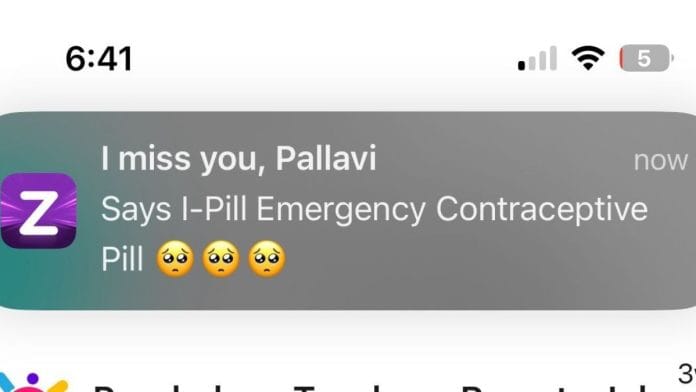Push notifications started out as helpful nudges, reminding you of a sale or other updates from your favourite app. But somewhere along the way, they’ve morphed into uninvited guests.
They bombard your screen, disrupt your day, and dig into your private habits. These push notifications were getting too intrusive and it was about time for the limits to be crossed.
Bengaluru-based quick commerce platform Zepto found itself in hot water after sending an inappropriate notification to a customer.
What was meant to be clever and funny became a PR nightmare, proving that sometimes, even the smartest campaigns can fall apart with one wrong move.
The notification sent to customer Pallavi Pareek read, “I miss you, Pallavi. Says i-Pill emergency contraceptive pill”, accompanied by three teary-eyed emoticons.
Pareek quickly took a screenshot of the notification and voiced her concerns on LinkedIn.
“First of all, I have never ordered an emergency pill from you. Even if I had, you should realize that this is not something that should be described as missing me or that I should be missing it,” Pareek wrote.
Although the brand was quick to apologise in the comments of the post, the situation had already escalated, with users criticising them for going “too far” in their marketing efforts with flirty messages.
Push notifications entered the market as personalised and relevant content but now it has spiralled into a constant barrage of “Hey, did you forget to buy this?” or “We noticed you haven’t logged in”. It’s as if apps now think they have the right to tap on your shoulder every five minutes.
These notifications, when far and few in between, came across as hilarious and creative but now they are simply annoying.
Take retail apps for example, they track my every move—reminding me of the shoes I browsed for last night and prompting me to buy them as if I am some forgetful shopper. Or the food delivery platforms that remind me every other day that I am single, and a bucket of fries and cheese-loaded chicken burger is the only company I might get. The world is out to get the money out of your pocket, one PN at a time.
Also read: What’s worse than losing your phone? Finding it
Data mining in disguise
Push notifications aren’t just annoying; they’re often a sign that your personal data is being mined. Ever noticed how an app reminds you of a product you barely glanced at once? It’s because they’re using your browsing patterns and location to predict your needs.
Some food delivery apps send reminders just around dinnertime, while travel apps hit you up after you’ve visited a booking site. Push notifications are the bait that can drop at any hour and lure you into the world of online shopping.
These notifications aren’t just digital noise—they disrupt the flow of real life. You’re in a meeting and your phone lights up: “Chanellise your inner pav bhaji…and butter your boss” (This is an actual notification from Zomato). There’s a reason people are putting their phones on ‘Do Not Disturb’ more often these days.
When apps act like they’re entitled to your attention 24/7, it’s not just disturbance—it’s invasive.
The problem is that brands have gone overboard, trying to fight for attention in an oversaturated market.
Every app thinks it’s more important than the last, but in reality, we’re all getting better at tuning them out. It’s time for brands to recognise that users want quality over quantity—timely, relevant, and sparing notifications that actually add value rather than hijacking our day.
Push notifications are supposed to enhance the user experience, not suffocate it. If brands and apps don’t take a step back and rethink their notification strategies, they’ll continue to alienate users, leaving us with only one option: turning them off for good.
And, just like that, a powerful marketing tool will be of no use. Push notification pushback is real.
Views are personal.
(Edited by Theres Sudeep)






